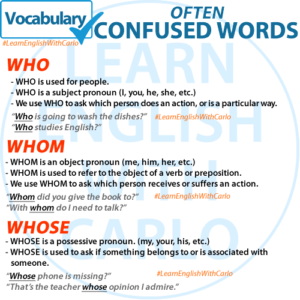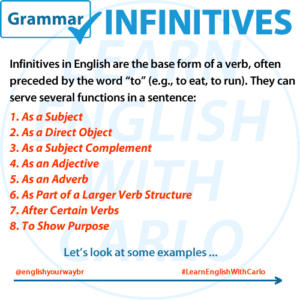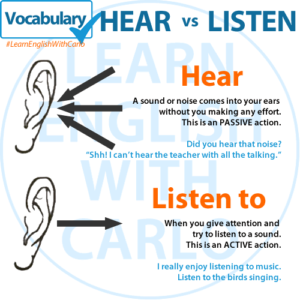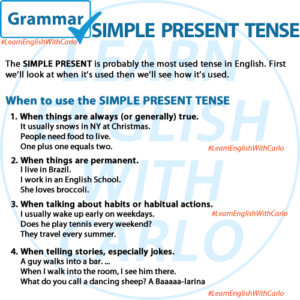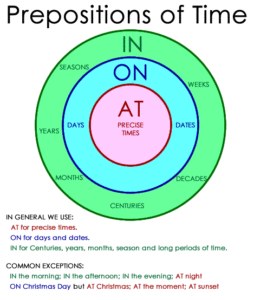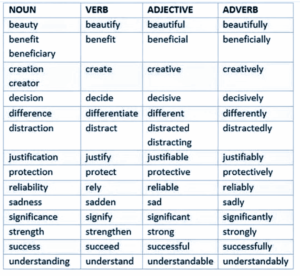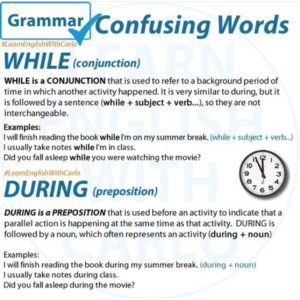These three words are often confused. Here’s a brief explanation of the differences between “who,” “whom,” and “whose”: 1. Who: 2. Whom: 3. Whose: Usage Tips: Examples: Understanding these differences will help you choose the correct word in various contexts. Practice using them in sentences with the QUIZ below!
Category: GRAMMAR
Permanent link to this article: https://englishyourway.com.br/who-whom-and-whose/
Jan 13
Infinitives
Infinitives in English are the base form of a verb, often preceded by the word “to” (e.g., to eat, to run). They can serve several functions in a sentence: 1. As a Subject: 2. As a Direct Object: 3. As a Subject Complement: 4. As an Adjective: 5. As an Adverb: 6. As Part of …
Permanent link to this article: https://englishyourway.com.br/infinitives/
Jan 04
GRAMMAR – HEAR & LISTEN
One of the most common questions English learners ask is: “What is the difference between ‘hear’ and ‘listen’?” These two verbs may seem similar, but they are used in different ways and convey distinct meanings. Let’s dive into the nuances of these two words to help you use them confidently in your conversations. Hear We …
Permanent link to this article: https://englishyourway.com.br/grammar-hear-listen/
Dec 30
GRAMMAR – SIMPLE PRESENT TENSE
The SIMPLE PRESENT is probably the most used tense in English. First, we’ll look at when it’s used then we’ll see how it’s used. When to use the SIMPLE PRESENT TENSE 1. When things are always (or generally) true.It usually snows in NY at Christmas.People need food to live.One plus one equals two. 2. When …
Permanent link to this article: https://englishyourway.com.br/grammar-simple-present-tense-2/
Dec 22
The Difference Between “Used to” and “Would”
When talking about past habits or repeated actions, learners of English often encounter two phrases: “used to” and “would.” While these two expressions have similarities, they are not interchangeable in every context. Let’s explore their meanings, uses, and differences in detail. What Does “Used to” Mean? “Used to” refers to habits, actions, or states that …
Permanent link to this article: https://englishyourway.com.br/used-to-vs-would/
Dec 17
PREPOSITIONS: of Time – In, on, at
Understanding prepositions of time can be tricky, but they’re essential for clear and accurate communication. Let’s break down the use of “in,” “on,” and “at” with examples to make them easier to grasp. 1. IN Use “in” for longer periods of time, such as months, years, centuries, and long periods: 2. ON Use “on” for …
Permanent link to this article: https://englishyourway.com.br/prepositions-of-time-in-on-at/
Dec 16
WORD FORMS
Welcome to our guide on how words can take different forms as nouns, verbs, adjectives, and adverbs! Many words in English change form depending on their role in a sentence, and understanding these transformations is key to mastering grammar and building vocabulary. Here you’ll find tables that show how specific words change across these categories, …
Permanent link to this article: https://englishyourway.com.br/noun-verb-adjective-adverb/
Dec 02
GRAMMAR – Verbal Nouns
What Are Verbal Nouns and How Are They Constructed? If you’ve ever encountered words like running, development, or decision, you’ve seen verbal nouns in action! Verbal nouns are a fascinating aspect of English grammar, as they combine the essence of an action (from verbs) with the grammatical function of a noun. Let’s dive into what …
Permanent link to this article: https://englishyourway.com.br/grammar-verbal-nouns/
Nov 28
The Difference Between “WHILE” & “DURING”
As an English learner, you may have noticed that both “while” and “during” are used to talk about time. However, they are used differently in sentences, and understanding how to use them correctly can make your English more accurate and natural. Let’s break down the key differences between these two words. 1. “WHILE” Usage:“While” is …
Permanent link to this article: https://englishyourway.com.br/difference-between-while-and-during-esl/
Nov 20
SO-SO and MORE OR LESS: What’s the Difference
While SO-SO and MORE OR LESS are short and simple phrases, they serve entirely different purposes in English. Let’s dive into their meanings, uses, and nuances. 1. SO-SO: The Language of the Average Definition:SO-SO is used to describe something that is average, ordinary, or not impressive. It conveys a neutral feeling—not good, not bad. When …
Permanent link to this article: https://englishyourway.com.br/difference-between-so-so-and-more-or-less/

